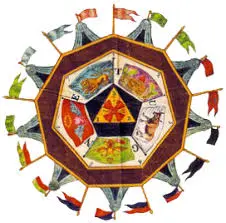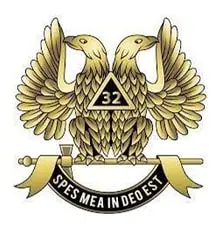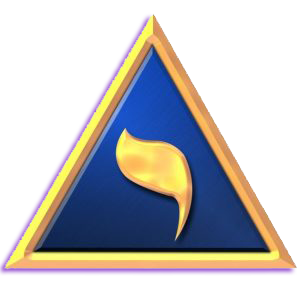
Scottish Rite Masonry
The true origins of the Scottish Rite dwell in antiquity. However, the traceable portions date to circa 1733 in continental Europe. A formal Scottish Rite presence was established in the United States in 1801. Concerning the Scottish Rite among Prince Hall Masons, the first acknowledged Scottish Rite organization surfaced in Philadelphia circa 1820 culminating in the formation of the United Supreme Council, Ancient & Accepted Scottish Rite of Freemasonry, Prince Hall Affiliation, Northern Jurisdiction, USA, Inc. Since that time our Jurisdiction has expanded to 23 Orients comprised of 29 states generally north of the Mason-Dixon line; 1 territory (Guam); 3 countries (The Commonwealth of the Bahamas, Barbados, and the Philippines) and a presence in 7 other countries (Bahrain, Canada, England, Germany, Japan, Korea, and Kuwait).
WHO WE ARE
Welcome to a Brotherhood like none other where you can join together with like-minded men and explore, more in depth, the moral truth and social virtues inculcated in the Ancient Craft Degrees and apply these studies to the rectitude of your liAs you progress from the 4th through 32nd degrees the moral lessons provided assist you in combating the modern day enemies of Ignorance, Superstition, Fanaticism, Despotism, and Ambition and are designed to resonate with and enhance your level of understanding of freemasonry. Alongside every successful man is a equally successful woman and that adage rings especially true concerning our ladies auxiliary—the Order of the Golden Circle. This valued group of women is comprised of the wives, mothers, daughters, and sisters of the membership.
WHAT WE DO
As the Scottish Rite is an extension of Ancient Craft Masonry, the same basic concepts of personal and fraternal development; community outreach; and extension of charity exist here as in Ancient Craft Masonry. The Scottish Rite seeks to improve and strengthen the character of the individual man, and through the individual, the character of the community, thus undergirding the community with those spiritual values which give it strength and stability. Our parent organization—the United Supreme Council, Ancient & Accepted Scottish Rite of Freemasonry, Prince Hall Affiliation, Northern Jurisdiction, USA, Inc.—is engaged in a number of ongoing endeavors to include: —ownership of the Scottish Rite House and Scottish Rite Tower: a combined 231 units of affordable housing for South Philadelphia’s elderly population; and—extension of charity to multiple organizations yearly through our Benevolent Foundation

Double Headed Eagle
The Double Headed Eagle of Lagash” is the oldest Royal Crest in the World… No emblematic device of today can boast of such antiquity. Its origin has been traced to the ancient city of Lagash. It was in use a thousand years before the Exodus from Egypt and more than two thousand years before the building of “King Solomon’s Temple.”
“As time rolled on, it passed from the Sumerians to the men of Akkad, from the men of Akkad to the Hittites, from the denizens of Asia Minor to the Seljukian Sultans from whom it was brought by the Crusaders to the Emperors of the East and West, whose successors were the Hapsburgs and the Romanoffs.”
“In recent excavations, the city-emblem of Lagash was disclosed also as a lion headed eagle sinking his claws into the bodies of two lions standing back to back. This is evidently a variant of the other eagle symbol”.
“The city of Lagash is in Sumer in Southern Babylonia, between the Euphrates and the Tigris and near the modern Shatra in Iraq, Lagash had a calendar of twelve lunar months, a system of weights and measures, a banking and accounting system and was a center of art, literature, military and political power, five thousand years before Christ”.
“In 102 B.C. the Roman Consul Marius decreed that the Eagle be displayed as a symbol of Imperial Rome. Later, as a world power, Rome used the Double-Headed Eagle, one head facing the East the other facing the West, symbolizing the universality and unity of the Empire. The Emperors of the Holy Roman Empire continued its use and the symbol was adopted later in Germany during the halcyon days of conquest and imperial power”.
So far as is known, the Double-Headed Eagle was first used in Freemasonry in 1758 by a Masonic Body in Paris – the Emperors of the East and West. During a brief period the Masonic Emperors of the East and West controlled the advanced degrees then in use and became a precursor of the “Ancient Accepted Scottish Rite”.
The Latin caption under the Double-Headed Eagle – “Spes Mea in Deo Est” translated is “My Hope Is In God”.
The Scottish Rite seeks to improve and strengthen the character of the individual man, and through the individual, the character of the community, thus undergirding the community with those spiritual values which give it strength and stability.

LODGE OF PERFECTION
4 – 14 DEGREES

ROSE CROIX
15 – 18 DEGREES

CONSISTORY
19 – 32 DEGREES
